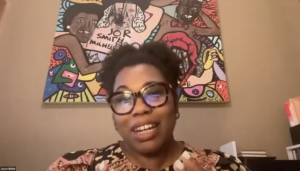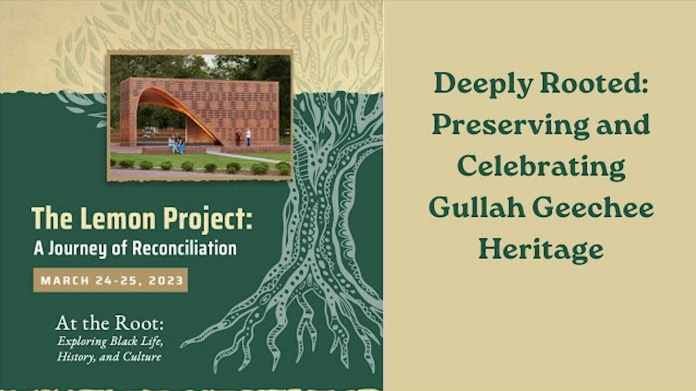Thursday, April 27th, the Lemon Project at the College of William and Mary hosted panelists in a lecture titled “Deeply Rooted: Preserving and Celebrating Gullah Geechee Heritage” to discuss the cultural heritage and preservation of the Gullah Geechee inhabitants of the Carolina Lowcountry and Georgia’s Coastal Empire.
The lecture took place as part of the Lemon’s Legacies Porch Talks Spring 2023 circuit and focused on the theme of the 13th Annual Lemon Project Spring Symposium: “At the Root: Exploring Black Life, History, and Culture.”
Panelists include Gullah Geechee consultant of Port Royal and St. Helena Island, South Carolina, Reginald Tendaji Bailey, assistant professor of English in Gullah Geechee Literature and Cultures at Georgia Southern University, Dr. Joyce White and assistant professor of Communication at the College of Coastal Georgia, Kyle R. Fox, Ph.D.
“The Gullah Geechee people are the descendants of Africans who were enslaved on the rice, indigo and Sea Island cotton plantations of the lower Atlantic coast,” Bailey said. “That area has been designated as the Gullah Geechee Corridor. It is the only National Heritage Area dedicated to a group of people. Throughout this area are a number of different communities and organizations that are supporting preservation and education about Gullah Geechee culture.”
Bailey is a Gullah Geechee native from Port Royal and St. Helena Island, South Carolina in Beaufort County. Bailey described the Gullah Geechee community in St. Helena, referencing the strength of their communication.
“St. Helena Island in particular has a stronghold on Gullah Geechee culture,” Bailey said.“ We’ve been able to maintain our property and maintain our land, which has really given us an opportunity to maintain our culture in a really significant way.”
Bailey noted that many institutions are lending their support with research and offer financial resources to help facilitate educational programs, symposiums and festivals to maintain the Gullah Geechee culture. Through this support, communities are able to address issues regarding cultural preservation, but also climate change and the impact of sea level rise on low-lying Barrier Island areas.

White described Georgia Southern University Provost and Vice President for Academic Affairs Carl L. Reiber, Ph.D.’s efforts to establish a Gullah Geechee heritage cultural center, which will officially open on Friday, June 16th.
“The other thing I will say is not only is this happening on a departmental and a college level, but also on a community level,” White said. “Our director of the Gullah Geechee center, Maxine Bryant calls it ‘communi-versity,’ where the community and the University come together and sort of bridge what is often seen as very siloed spaces, to bridge those and really talk about the issues facing the Gullah Geechee communities and how the University can be part of solutions.”
Though Fox does not identify as Gullah Geechee, he has invested significant interest in the space and culture. Fox’s involvement at the College of Coastal Georgia allows him to commit his time to the Gullah Geechee community through education.

“We are committed to this community and an initiative to highlight the Gullah Geechee community in our region,” Fox said.
Fox proposed a Gullah Geechee initiative to the administration at the College of Coastal Georgia that is composed of academic, cultural and performative elements. Rather than hiring faculty specifically for a position in the initiative, interested individuals on campus would come together to bring awareness to the Gullah Geechee culture.
“I’m trying to not only establish an academic and institutional relationship with the community, but a community within that space,” Fox said.
Bailey highlighted a recent study which estimated that within Gullah Geechee Heritage tourism, there is an annual surplus of roughly $31-34 billion dollars allocated to give to Gullah Geechee communities. However, no existing infrastructure is in place to support the receival of these funds and to delegate funds to appropriate parties.
“What I’ve liked so far working with the Morehouse Mellon Public History project is that there’s a great effort in trying to develop exhibits within communities and having communities at the center of telling their stories and making sure their communities are benefiting from being the storytellers of their own stories,” Bailey said.
Through acknowledging the importance of history, White highlighted the need to study and preserve generational legacies.
“That’s where we’re headed, to a place where all of us can be on this bus together, proud and holding our banner and preserving this culture in our own ways.”
“I was at an event the other day with some community members of Gullah Geechee and they said, ‘Every Black folk in America is Gullah Geechee. So, just claim your heritage,’” White said. “And if that’s the case, then that means all of us have a responsibility and a duty to maintain and preserve a culture that has really, to be honest, shaped the American landscape.”
In earlier historical periods, the terms “Gullah” and “Geechee” were considered derogatory. In the modern age, a shift in perception of the terms has allowed individuals to embrace Gullah Geechee culture and identities and feel proud of their heritage.
“That’s where we’re headed, to a place where all of us can be on this bus together, proud and holding our banner and preserving this culture in our own ways,” Bailey said.
The three panelists introduced their current projects, promoted upcoming events and shared personal work.
As a Gullah Geechee creative consultant, Bailey works with communities throughout the Corridor to promote events such as the Gullah Geechee Culture and Nature Festival, which will take place in Atlantic Beach, Florida, from Friday, June 23 to Sunday, June 25. The Festival will mark the first Gullah Geechee Culture Festival in three decades.
Bailey also introduced his recent venture into the art world, noting his recent art project titled “Seeking/Soaring” for the South Carolina Arts Commission.
“It’s really sent me on a new journey and I’m super excited to share the things that I’ve learned along the way,” Bailey said. “That should be coming out in June.”
Fox shared his desire to branch out of the world of academia, acknowledging the recent events he hosted during Black History Month and his current work developing a service learning course for students to plan and execute a Gullah Geechee Initiative Symposium on the campus of the College of Coastal Georgia.
“Not only am I involved in this, but I want my students to be strengthened in that space as well, so that they would have respect for this place that they inhabit while they are here for those four years,” Fox said.
White recently spoke as part of the Unitarian Universalist Church anti-racism committee in Savannah, Georgia for a dialogue after the screening of Julie Dash’s “Daughters of the Dust.”
“It’s just one of the examples that I’m giving in terms of opportunities to bridge academia and community,” White said.
The panelists concluded the talk with a brief question and answer session with members of the audience.

